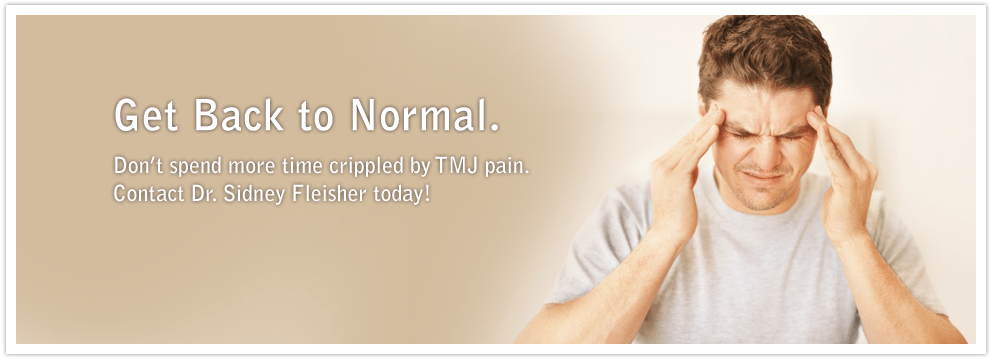What is TMJ?
The temporomandibular joint (TMJ) is the joint located between the jaw line (the mandible), and the skull, just in front of the ear. Placing a finger on the face just in front of the ear, and opening and closing the jaw, will elicit the movement of the mandibular bone and the location of the TMJ.
To be accurate, what is generally referred to as TMJ is in fact, Myofascial Pain Dysfunction (MPD). Myofascial Pain is a disorder of the muscles, tooth contact and clenching, although, its treatment always involves the temporomandibular joint.
Who is Affected by TMJ?
While TMJ disorders and MPD are distinctly different disorders, they have many features in common. Both disorders occur at any age from teens to later in life in both men and women, but predominately in women.
Common Causes of TMJ Disorder
Temporomandibular joint (TMJ) and myofascial pain dysfunction (MPD) may be caused by:
- Trauma to the head or neck, e.g. whiplash
- Pathology or trauma to the joint itself, e.g. arthritis
- Hormonal imbalances, e.g.. growth spurts in teens, menstrual cycle and menopause in women
- Medications, which have the side effect of clenching
- Malocclusion (jaws which do not line up correctly), e.g. post orthodontic treatment, after wisdom tooth extraction, or teeth which interfere with correct closure of the jaw
- Stress (the greatest contributing factor) – whether it is high exposure to stress, or low threshold for stress
- Trigger points in the neck and shoulder regions
The Great Impostor
Because of the symptoms, MPD and TMJ dysfunction is known in medical circles as “The Great Impostor”. The symptoms may be one, or as in many cases, a combination of all of the following:
- Headaches – waking in the morning with a throbbing headache. Patients often say they have been told they suffer from migraines (which is actually a misdiagnosis)
- Shoulder Pain, which can mimic a rotator cuff injury
- Stiff, sore neck upon waking, with painful, restricted range of motion (ROM)
- Tingling in fingers and arm pain
- Pain in the trapezius muscles, the shoulder blades and surrounding shoulder areas, commonly affecting only one side
- Restricted jaw opening with concomitant pain and clicking joints (clicking joints may or may not be present)
- Inability to smile or experiencing facial pain when trying to smile
- Clicking, popping or grinding in the jaw joint when opening or closing the mouth
- Locking jaws (inability to open or close mouth)
- Dentition related factors, fracturing teeth, tooth sensitivity to temperature changes, abraded and worn teeth requiring root canal treatment, yet there is no decay, and teeth with clefts at the gum line
- Ear pain with no infection; ringing, buzzing, rushing water sounds and other unusual ear noises (if the sounds heard are more than 5 years in duration, chances of a full recovery are reduced, but these symptoms can be kept from getting worse)
- Clenching the teeth during sleep, disturbed sleep patterns, no dreaming and waking tired
- Light headedness when walking
- Symptoms of collapsed or plugged eustachian tube, as when flying in a plane, popping, stuffy ears
- Snoring (with negative sleep apnea diagnosis)
- Shooting or throbbing pain behind the eyes (usually affecting one eye)
- Difficulty swallowing or constantly choking on food when eating
- Exacerbation of symptoms when wearing a non-customized splint (night guard)
Negative Effects of TMJ Disorders
Ones overall health may be adversely affected by TMJ dysfunction. Lack of sleep and pain may lead to apprehension, depression and a myriad of other serious symptoms. This also includes liver and kidney problems as a result of chronic consumption of painkillers. In many cases sleep deprivation is due to nighttime clenching.
TMJ Therapy
The ideal treatment for TMJ or MPD is to prevent clenching and to correct the occlusion (bite), allowing the teeth to come together (without any interferences), into a comfortable complete closure of the jaws. To prevent clenching, a special splint (night guard) must be fabricated. This will allow the jaws to close so that the closing muscles will be relaxed; ie. in a resting state, called a peaceful neuromusculature.
Can TMJ Be Cured?
The answer is complex, the primary reasons for clenching at night or during the day are stress and the ability of the individual to cope with stress. As long as you live you cannot avoid stress, the one variable being increasing ones tolerance for the stress through relaxation techniques such as yoga, as well as biofeedback, hypnosis and in severe cases, medication.
If you feel that you have a TMJ problem and have sought treatment through your family care physician to rule out pathology, contact Dr. Fleisher to schedule a comprehensive evaluation.

